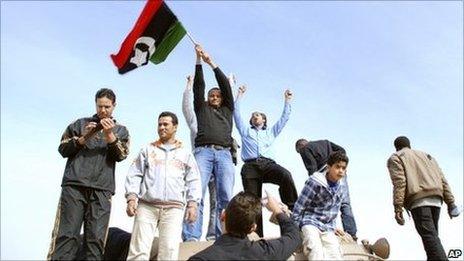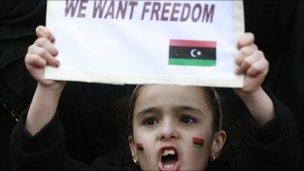Libya unrest: Is Gaddafi's rule facing collapse?
- Published

Protesters celebrated in Benghazi on Monday, claiming control of the city
The demonstrations in Libya that began in the city of Benghazi seem, to general amazement, to have given the protesters effective control of the east of the country.
Until Sunday, the only demonstrations in Tripoli had been in support of the regime and its leader, no doubt as an official riposte to those in the east who have been calling for its demise.
In any case, Colonel Muammar Gaddafi's personal lack of corruption and political idiosyncrasy had earned him grudging popular respect, despite the brutality of his regime. Furthermore, in recent years, he has not hesitated to improve economic conditions to buy social peace.
This has now changed, with demonstrations in the heart of the capital on Sunday, pitting pro- and anti-regime supporters against each other, together with security force intervention which resulted in hundreds of dead and injured.
A rambling speech by Saif al-Islam, Col Gaddafi's second son, promising unlimited concessions but warning of civil war as the regime would not given in, did little to calm the situation.
As a result, the regime now seems to be in very serious trouble. In the wake of the violence, Colonel Gaddafi, according to some reports, seems to have retreated to his support bases in Sirte or Sebha to organise his response.
'Deliberate neglect'
The fact that anti-regime demonstrations were first confined to the region of Cyrenaica in the east of the country gives us a clue as to what actually happened.
Eastern Libya has long been hostile to the jamahiriyah, Colonel Gaddafi's "state-of-the-masses" based on "direct popular democracy" which decrees that all Libyans shall participate in the political process and which, to ensure that they reach the right conclusions, uses the Revolutionary Committee movement to discipline them.
Cyrenaica, after all, was the birthplace of the monarchy that preceded the revolution, whilst Benghazi has always spurned the regime for its lack of revolutionary rigour.
Benghazi itself also has other grounds for rejecting the regime; it housed the 413 children infected in the late 1990s by HIV because of appalling sanitary conditions in its hospital.
And it was in Benghazi, in 2006, that several died at the hands of the security forces during demonstrations against Italy over its apparent support for Denmark in the cartoons crisis.
Earlier, in the second half of the 1990s, an Islamist rebellion centred on Benghazi and Derna threatened the regime.
As a result, Colonel Gaddafi's government has deliberately neglected and persecuted people in Cyrenaica, provoking more demonstrations in recent years in turn.
'No hesitation'
The regime, however, has powerful forces, totalling 119,000, at its disposal and, in the past, it has never hesitated to use them if it felt threatened by Libya's six million people.
Quite apart from the 45,000-strong army and the police, where loyalties have, on occasion, been uncertain, there is the mukhabarat (the security service) and the revolutionary committee movement which has brutally disciplined Libyan society ever since the 1980s.

Protests have been held outside Libyan embassies in a number of countries
Its activists are committed to the regime by tribal affiliation as well as ideological preference, for they are drawn from the regime's tribal bulwark in the Qadhadhfa, the Maghraha and the Warfalla and, as revolutionaries, they are entirely unaccountable to anyone except the colonel himself.
Alongside them is the Deterrent Battalion, the notorious 32nd Brigade, based at Ouezzane on the Jebel Nefusa, close to the border with Tunisia, commanded by Col Gaddafi's second-youngest son, Khemis, and designed to deal with domestic disorder.
There is also the shadowy Islamic Legion, created in the 1980s from Muslims from the Sahel and probably behind the rumours of "foreign mercenaries" operating in eastern Libya.
The regime, in short, has manifold mechanisms of repression available to it and, in the past, has never shown any hesitation in responding brutally to the slightest sign of challenge.
In 1996, during a protest in Tripoli's Abu Salim prison, at least 1,000 prisoners were killed by the security forces engaged in suppressing the disturbances.
There is no reason to assume that the Gaddafi regime would not take equally as drastic measures today if its hold on power is seriously threatened.
It is for that reason that Saif al-Islam hinted at the terrible consequences that might follow continued demonstrations.
It is not certain that the demonstrators are listening, however.
On Monday, a Warfalli leader, no doubt remembering the regime's bloody revenge after a failed coup launched by tribal members in the army in 1993, threatened to abandon the regime.
Yet, should all else, even his revolutionary reputation, fail him, Colonel Gaddafi has oil wealth to tap to guarantee the survival of himself, his family and even, perhaps, of his regime.